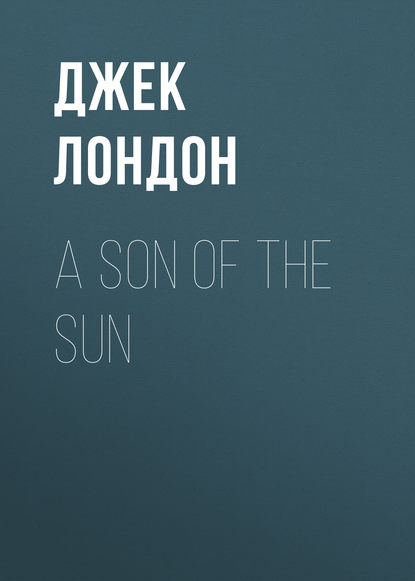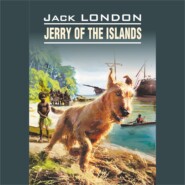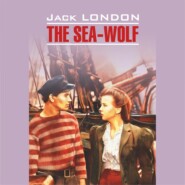По всем вопросам обращайтесь на: info@litportal.ru
(©) 2003-2024.
✖
A Son Of The Sun
Настройки чтения
Размер шрифта
Высота строк
Поля
“I can’t. He’s got all my money. If I did, he wouldn’t give me sixpence to buy a drink with.”
This woful possibility brought a fresh wash of tears. Grief was interested. Of all unique situations he could never have imagined such a one as this.
“They were engaged to take care of me,” Pankburn was blubbering, “to keep me away from the drink. And that’s the way they do it, lollygagging all about the ship and letting me drink myself to death. It isn’t right, I tell you. It isn’t right. They were sent along with me for the express purpose of not letting me drink, and they let me drink to swinishness as long as I leave them alone. If I complain they threaten not to let me have another drop. What can a poor devil do? My death will be on their heads, that’s all. Come on down and join me.”
He released his clutch on the rail, and would have fallen had Grief not caught his arm. He seemed to undergo a transformation, to stiffen physically, to thrust his chin forward aggressively, and to glint harshly in his eyes.
“I won’t let them kill me. And they’ll be sorry. I’ve offered them fifty thousand – later on, of course. They laughed. They don’t know. But I know.” He fumbled in his coat pocket and drew forth an object that flashed in the faint light. “They don’t know the meaning of that. But I do.” He looked at Grief with abrupt suspicion. “What do you make out of it, eh? What do you make out of it?”
David Grief caught a swift vision of an alcoholic degenerate putting a very loving young couple to death with a copper spike, for a copper spike was what he held in his hand, an evident old-fashioned ship-fastening.
“My mother thinks I’m up here to get cured of the booze habit. She doesn’t know. I bribed the doctor to prescribe a voyage. When we get to Papeete my manager is going to charter a schooner and away we’ll sail. But they don’t dream. They think it’s the booze. I know. I only know. Good night, sir. I’m going to bed – unless – er – you’ll join me in a night cap. One last drink, you know.”
II
In the week that followed at Papeete Grief caught numerous and bizarre glimpses of Aloysius Pankburn. So did everybody else in the little island capital; for neither the beach nor Lavina’s boarding house had been so scandalized in years. In midday, bareheaded, clad only in swimming trunks, Aloysius Pankburn ran down the main street from Lavina’s to the water front. He put on the gloves with a fireman from the Berthe in a scheduled four-round bout at the Folies Bergères, and was knocked out in the second round. He tried insanely to drown himself in a two-foot pool of water, dived drunkenly and splendidly from fifty feet up in the rigging of the Mariposa lying at the wharf, and chartered the cutter Toerau at more than her purchase price and was only saved by his manager’s refusal financially to ratify the agreement. He bought out the old blind leper at the market, and sold breadfruit, plantains, and sweet potatoes at such cut-rates that the gendarmes were called out to break the rush of bargain-hunting natives. For that matter, three times the gendarmes arrested him for riotous behaviour, and three times his manager ceased from love-making long enough to pay the fines imposed by a needy colonial administration.
Then the Mariposa sailed for San Francisco, and in the bridal suite were the manager and the trained nurse, fresh-married. Before departing, the manager had thoughtfully bestowed eight five-pound banknotes on Aloysius, with the foreseen result that Aloysius awoke several days later to find himself broke and perilously near to delirium tremens. Lavina, famed for her good heart even among the driftage of South Pacific rogues and scamps, nursed him around and never let it filter into his returning intelligence that there was neither manager nor money to pay his board.
It was several evenings after this that David Grief, lounging under the after deck awning of the Kittiwake and idly scanning the meagre columns of the Papeete Avant-Coureur, sat suddenly up and almost rubbed his eyes. It was unbelievable, but there it was. The old South Seas Romance was not dead. He read:
WANTED – To exchange a half interest in buried treasure,
worth five million francs, for transportation for one to an
unknown island in the Pacific and facilities for carrying
away the loot. Ask for FOLLY, at Lavina’s.
Grief looked at his watch. It was early yet, only eight o’clock.
“Mr. Carlsen,” he called in the direction of a glowing pipe. “Get the crew for the whale-boat. I’m going ashore.”
The husky voice of the Norwegian mate was raised for’ard, and half a dozen strapping Rapa Islanders ceased their singing and manned the boat.
“I came to see Folly, Mr. Folly, I imagine,” David Grief told Lavina.
He noted the quick interest in her eyes as she turned her head and flung a command in native across two open rooms to the outstanding kitchen. A few minutes later a barefooted native girl padded in and shook her head.
Lavina’s disappointment was evident.
“You’re stopping aboard the Kittiwake, aren’t you?” she said. “I’ll tell him you called.”
“Then it is a he?” Grief queried.
Lavina nodded.
“I hope you can do something for him, Captain Grief. I’m only a good-natured woman. I don’t know. But he’s a likable man, and he may be telling the truth; I don’t know. You’ll know. You’re not a soft-hearted fool like me. Can’t I mix you a cocktail?”
III
Back on board his schooner and dozing in a deck chair under a three-months-old magazine, David Grief was aroused by a sobbing, slubbering noise from overside. He opened his eyes. From the Chilian cruiser, a quarter of a mile away, came the stroke of eight bells. It was midnight. From overside came a splash and another slubbering noise. To him it seemed half amphibian, half the sounds of a man crying to himself and querulously chanting his sorrows to the general universe.
A jump took David Grief to the low rail. Beneath, centred about the slubbering noise, was an area of agitated phosphorescence. Leaning over, he locked his hand under the armpit of a man, and, with pull and heave and quick-changing grips, he drew on deck the naked form of Aloysius Pankburn.
“I didn’t have a sou-markee,” he complained. “I had to swim it, and I couldn’t find your gangway. It was very miserable. Pardon me. If you have a towel to put about my middle, and a good stiff drink, I’ll be more myself. I’m Mr. Folly, and you’re the Captain Grief, I presume, who called on me when I was out. No, I’m not drunk. Nor am I cold. This isn’t shivering. Lavina allowed me only two drinks to-day. I’m on the edge of the horrors, that’s all, and I was beginning to see things when I couldn’t find the gangway. If you’ll take me below I’ll be very grateful. You are the only one that answered my advertisement.”
He was shaking pitiably in the warm night, and down in the cabin, before he got his towel, Grief saw to it that a half-tumbler of whiskey was in his hand.
“Now fire ahead,” Grief said, when he had got his guest into a shirt and a pair of duck trousers. “What’s this advertisement of yours? I’m listening.”
Pankburn looked at the whiskey bottle, but Grief shook his head.
“All right, Captain, though I tell you on whatever is left of my honour that I am not drunk – not in the least. Also, what I shall tell you is true, and I shall tell it briefly, for it is clear to me that you are a man of affairs and action. Likewise, your chemistry is good. To you alcohol has never been a million maggots gnawing at every cell of you. You’ve never been to hell. I am there now. I am scorching. Now listen.
“My mother is alive. She is English. I was born in Australia. I was educated at York and Yale. I am a master of arts, a doctor of philosophy, and I am no good. Furthermore, I am an alcoholic. I have been an athlete. I used to swan-dive a hundred and ten feet in the clear. I hold several amateur records. I am a fish. I learned the crawl-stroke from the first of the Cavilles. I have done thirty miles in a rough sea. I have another record. I have punished more whiskey than any man of my years. I will steal sixpence from you for the price of a drink. Finally, I will tell you the truth.
“My father was an American – an Annapolis man. He was a midshipman in the War of the Rebellion. In ‘66 he was a lieutenant on the Suwanee. Her captain was Paul Shirley. In ‘66 the Suwanee coaled at an island in the Pacific which I do not care to mention, under a protectorate which did not exist then and which shall be nameless. Ashore, behind the bar of a public house, my father saw three copper spikes – ship’s spikes.”
David Grief smiled quietly.
“And now I can tell you the name of the coaling station and of the protectorate that came afterward,” he said.
“And of the three spikes?” Pankburn asked with equal quietness. “Go ahead, for they are in my possession now.”
“Certainly. They were behind German Oscar’s bar at Peenoo-Peenee. Johnny Black brought them there from off his schooner the night he died. He was just back from a long cruise to the westward, fishing beche-de-mer and sandalwood trading. All the beach knows the tale.”
Pankburn shook his head.
“Go on,” he urged.
“It was before my time, of course,” Grief explained. “I only tell what I’ve heard. Next came the Ecuadoran cruiser, of all directions, in from the westward, and bound home. Her officers recognized the spikes. Johnny Black was dead. They got hold of his mate and logbook. Away to the westward went she. Six months after, again bound home, she dropped in at Peenoo-Peenee. She had failed, and the tale leaked out.”
“When the revolutionists were marching on Guayaquil,” Pankburn took it up, “the federal officers, believing a defence of the city hopeless, salted down the government treasure chest, something like a million dollars gold, but all in English coinage, and put it on board the American schooner Flirt. They were going to run at daylight. The American captain skinned out in the middle of the night. Go on.”
“It’s an old story,” Grief resumed. “There was no other vessel in the harbour. The federal leaders couldn’t run. They put their backs to the wall and held the city. Rohjas Salced, making a forced march from Quito, raised the siege. The revolution was broken, and the one ancient steamer that constituted the Ecuadoran navy was sent in pursuit of the Flirt. They caught her, between the Banks Group and the New Hebrides, hove to and flying distress signals. The captain had died the day before – blackwater fever.”
“And the mate?” Pankburn challenged.
“The mate had been killed a week earlier by the natives on one of the Banks, when they sent a boat in for water. There were no navigators left. The men were put to the torture. It was beyond international law. They wanted to confess, but couldn’t. They told of the three spikes in the trees on the beach, but where the island was they did not know. To the westward, far to the westward, was all they knew. The tale now goes two ways. One is that they all died under the torture. The other is that the survivors were swung at the yardarm. At any rate, the Ecuadoran cruiser went home without the treasure. Johnny Black brought the three spikes to Peenoo-Peenee, and left them at German Oscar’s, but how and where he found them he never told.”
Pankburn looked hard at the whiskey bottle.
“Just two fingers,” he whimpered.
Grief considered, and poured a meagre drink. Pankburn’s eyes sparkled, and he took new lease of life.
“And this is where I come in with the missing details,” he said. “Johnny Black did tell. He told my father. Wrote him from Levuka, before he came on to die at Peenoo-Peenee. My father had saved his life one rough-house night in Valparaiso. A Chink pearler, out of Thursday Island, prospecting for new grounds to the north of New Guinea, traded for the three spikes with a nigger. Johnny Black bought them for copper weight. He didn’t dream any more than the Chink, but coming back he stopped for hawksbill turtle at the very beach where you say the mate of the Flirt was killed. Only he wasn’t killed. The Banks Islanders held him prisoner, and he was dying of necrosis of the jawbone, caused by an arrow wound in the fight on the beach. Before he died he told the yarn to Johnny Black. Johnny Black wrote my father from Levuka. He was at the end of his rope – cancer. My father, ten years afterward, when captain of the Perry, got the spikes from German Oscar. And from my father, last will and testament, you know, came the spikes and the data. I have the island, the latitude and longitude of the beach where the three spikes were nailed in the trees. The spikes are up at Lavina’s now. The latitude and longitude are in my head. Now what do you think?”

















